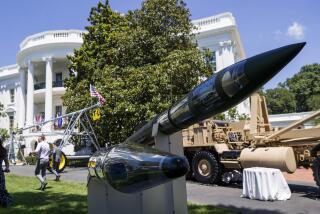20,000 GIs May Be Sent to Bosnia as Peacekeepers
WASHINGTON â The Clinton Administration is making preliminary plans for deploying up to 20,000 U.S. ground troops to help with U.N. peacekeeping efforts in Bosnia-Herzegovina if talks in Geneva produce a peace accord to end the bitter conflict, U.S. officials said Monday.
But President Clinton said no final decision will be made on the number of troops and how they will be deployed until he is certain that any peace agreement is âfair, fully embraced by the Bosnian government and is enforceable.â
âThe United States is prepared to participate in a multinational effort to keep the peace in Bosnia, but I want to see what the details are,â Clinton told reporters. âI also want to know whose responsibility it is to stay for how long.â
U.S. officials and private military experts cautioned that the decision will be a difficult one, complicated by the shrinking U.S. military budget, limited sea- and airlift capability and a much smaller total armed forces structure.
In February, the President promised to provide U.S. troops to help enforce a peace accord proposed then, but that pact fell through and never was completed. Officials said the promise would hold for a new peace accord.
With the three warring factions in Bosnia--the Bosnian Serbs, Bosnian Croats and the predominantly Muslim government--edging closer to a peace agreement, U.N. mediator Thorvald Stoltenberg has asked for assurances that U.S. troops will help enforce it. The Administrationâs statements Monday were aimed at reiterating its intention to carry out its pledge.
With Washingtonâs approval, planners at the North Atlantic Treaty Organization also have begun drafting plans for 40,000 NATO troops to take on enforcement operations. U.S. authorities estimate that if that number holds firm, the United States will provide about half of these troops.
NATO officials said the current planning amounts mainly to updating and refocusing plans that the 16-country organization made in anticipation of last Februaryâs peace proposal.
They said the organization has been reluctant to engage in full-scale, public planning because the details of the new pact are not settled and because NATO still is maintaining its threat to launch air strikes against the Serbs if Sarajevo comes under heavy attack.
Even if a new accord is signed in Geneva, the job of enforcing the pact could be a dangerous and lengthy one, military analysts said--particularly if one or more of the three warring factions is unwilling to cooperate with the peacekeepers.
U.S. officials are pushing to move artillery and heavy equipment into the region as soon as they can after the pact is agreed to--mostly from U.S. arsenals in Germany and other depots in Europe. They then would seek to impound the heavy weapons now being used by all three sides.
NATO planning is being overseen by Adm. Jeremy Michael Boorda, commander of allied forces in Southern Europe, who was in charge of drafting the operations for the February enforcement proposal.
Clintonâs caution during his press conference Monday--held after meeting with Caribbean leaders on his first day back in Washington after vacationing--reflects similar misgivings that have been voiced by members of the Joint Chiefs of Staff. U.S. officials said the Administration is not likely to come up with a firm answer on U.S. troop involvement until after the peace plan has been hammered out and American officials have had time to consult with allies and members of Congress.
The Administration faces several obstacles in mounting such a force, not the least among them the cost and the question of where the United States would obtain the troops as its military shrinks.
Robert W. Gaskin, a former Pentagon planner, pointed out that to field 20,000 troops, the Administration would need to deploy three full-strength divisions--one to go into the field and a second and third to be in training for later rotation.
With the recent troop reductions, the United States has only four divisions capable of such duty. As a result, Gaskin said, Clinton either would have to impinge on the nationâs ability to fight two major regional conflicts at once or call up reserves.
âWe donât have the capability to peel off all those people for peacekeeping duties and still be able to handle a major regional contingency,â or regional conflict, Gaskin said. âWeâd have to turn to the National Guard and reserves.â
More to Read
Sign up for Essential California
The most important California stories and recommendations in your inbox every morning.
You may occasionally receive promotional content from the Los Angeles Times.










